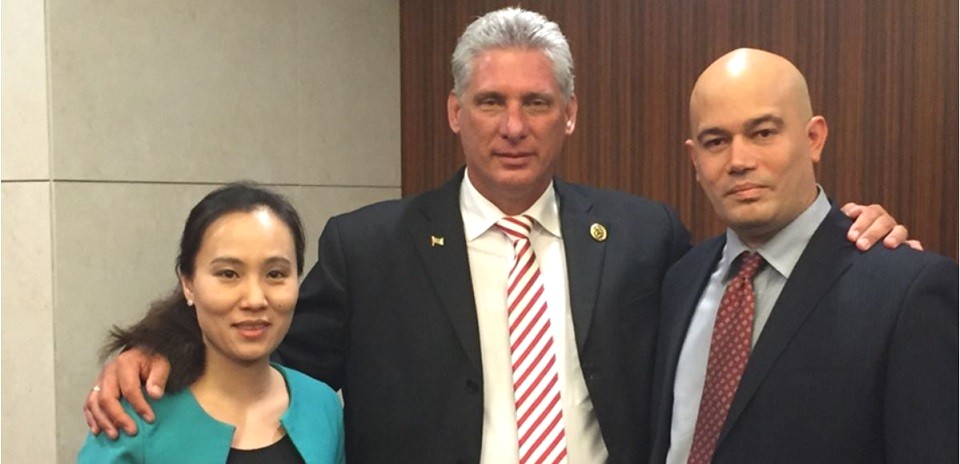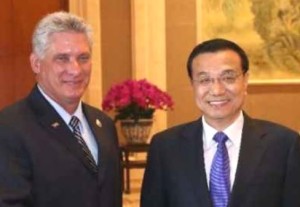
Díaz-Canel shares thoughts with journalists in China
While in Beijing last week to attend the celebration of Victory Day over Japan in World War II, Cuban Vice President Miguel Díaz-Canel gave an interview to the Spanish edition of The People’s Daily. Progreso Weekly has translated some excerpts and publishes them below. (For the full text, in Spanish, click here.)
ON CHINA’S ROLE IN THE DEFEAT OF JAPAN
If the Chinese had not won, the Japanese would have reached the border with the Soviet Union at the same time that fascist Germany was invading the USSR. One wonders what history might have turned out to be without China’s victory.
I believe that, on occasion, people have tried to underestimate this fact, to purposely devalue it as part of that campaign of neoliberal and capitalist restoration that they’re trying to impose upon us, whose intent it is to erase history, distort it, trivialize it, vulgarize it, remove all political commitment.
[China’s victory] is an important and significant factor, so the world may not forget history and reach conclusions that will enable us to avoid war, live in peace and devote our resources and human talent to preserve peace and the development of all, as equals.
ON CUBA-CHINA RELATIONS TODAY

In the first place, we have a broad range of political exchanges. At a political level, our relations are kept at a very high level. […] At party level, there is a very fluid exchange. […] Leaders of China’s politburo have been in Cuba and have informed us about the process of reforms; also, Cuban party leaders have visited China and have reported to the leadership of that country about the implementation of the [Economic] Guidelines.
In the past 10 years, China has become our second economic partner, the second source of our imports and the second country to which we send our exports. In turn, China grants us important financial facilities in terms of credit and insurance — short, medium and long range — that facilitate the development of economic and social projects in our country. […]
That a large, developed country like China and a small country like Cuba maintain a relationship of mutual respect, brotherhood, and friendship; that we can share with honesty and transparency what we each do in our respective processes without pretending that our processes are equal (because we understand that each has to act according to its own peculiarities), in today’s world these are not only paradigmatic relations but also exemplary relations.
ON THE UPDATING OF CUBA’S ECONOMY
[Our main achievements have been] to unleash the productive forces and open the non-state sector of the economy. In a way, that’s already a reality in Cuba. Now, we advance toward other forms of the non-state sector, such as the cooperatives, with the understanding that ours is not the non-state sector of a neoliberal country that has no commitment to society.
The non-state sector that we have recognized and is being developed in Cuba is part of the planning of Cuba’s economy. This sector has been assigned, on a yearly basis, a percentage of the Gross Domestic Product (GDP) that it must contribute and the labor force that it must develop.
And it has also been assigned the investments it needs to obtain the raw materials and supplies that will allow it to development its products and services. I believe that that has been a step forward, because it has unburdened the State from a whole slew of problems. […]
People say that we’re moving too slowly. My feeling is that there is such an accumulation of problems that, in order not to act incorrectly, we are following a dynamics that allows us to work in depth. […]
ON THE OBSTACLES AHEAD
The main obstacle has been the change of mentality. […] Changing people’s mindset takes a lot of work. There are things that don’t have the impact we need because people’s mentality doesn’t change at the pace we’d like. Some things are not broached as a whole because people’s mindset has not changed as much as needed to become a proactive element in this process.
We have to advance more in terms of food production and commercialization. Also in the relationship between the average wage and the prices. This is one of the things that affects the Cuban population the most, and causes the greatest dissatisfaction. We have not been able to solve this.
It has to do with productive elements and efficiency. And with the correlation between the way a person can earn according to his contribution and the ability of the wages to cover his essential needs.
I don’t think that, at this stage, the prices can remain the same as in previous stages. That’s why I don’t like to talk only about prices but instead about the relationship between the average wage and the prices. […] Of course, we cannot distribute wealth that hasn’t been produced. We also have to advance a lot in terms of our tax culture.
One of the elements of the Guidelines that seems to me most novel is the territorial development, which we have not accomplished to its full capacity. To the degree that the local governments can give more attention to the regional problems — with greater decentralization, responsibility, creativity and innovation — we will advance a lot farther.
[Photo at top shows Miguel Díaz-Canel and the journalists from People Online, Liu Xuxia (at left) and Yasef Ananda Calderón.]

